In the quest for optimal health, antioxidants stand out as crucial allies for men in the fight against chronic diseases. This detailed guide explores the potent benefits of key antioxidants, including Vitamin C, Vitamin E, Carotenoids, Flavonoids, Selenium, Zinc, Coenzyme Q10, and Polyphenols. Each section sheds light on how these nutrients function to protect the body from environmental stressors and internal imbalances that can lead to serious health issues. By incorporating these antioxidants into their daily regimen, men can enhance their body’s resilience against disease and aging, promoting a healthier, more vibrant life.
I. Vitamin C (Ascorbic Acid):
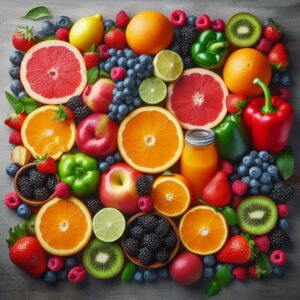
Before we delve deeper into the specifics of Vitamin C, let’s take a moment to appreciate its significance. As an essential nutrient that our bodies cannot produce on their own, Vitamin C must be obtained through our diet.
1. What is Vitamin C?
vitamin C, scientifically known as ascorbic acid, is a crucial water-soluble vitamin that is not synthesized by the human body. It must be ingested through diet or supplements. Known for its powerful antioxidant properties, Vitamin C plays a pivotal role in combating free radical damage, boosting the immune system, and promoting overall health.
2. Sources of Vitamin C:
To incorporate Vitamin C into the diet, men should focus on consuming a variety of fruits and vegetables. Key sources include:
– Citrus fruits: Oranges, grapefruits, lemons, and limes
– Berries: Strawberries, raspberries, blueberries, and blackberries
– Kiwis: Rich in Vitamin C and also provide other essential nutrients like fiber
– Bell peppers: Especially red and yellow peppers, which have higher levels of Vitamin C than their green counterparts
– Spinach: Along with other leafy greens, spinach is not only a good source of Vitamin C but also provides iron and calcium
3. Vitamin C’s Role in Preventing Chronic Diseases:
Vitamin C’s impact on chronic disease prevention can be seen in several key areas:
– Heart Health: Vitamin C helps in reducing heart disease risk factors, including high blood pressure and arterial stiffness. It also promotes healthy endothelial function and improves nitric oxide production, which aids in vasodilation and blood flow.
– Cancer Prevention: Research suggests that the antioxidant properties of Vitamin C may reduce the risk of certain cancers by combating free radicals, substances that can damage DNA and promote tumor growth.
– Skin Aging: Vitamin C is pivotal in the production of collagen, a protein essential for the structure and health of skin, blood vessels, and bones. Collagen degradation can lead to skin aging and other health issues.
– Immune System Support: It strengthens the immune system by enhancing the production and function of white blood cells and antibodies, which are crucial in fighting infections.
II. Vitamin E (Tocopherol):
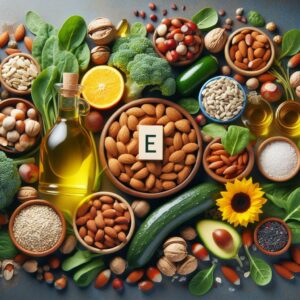
As men strive to maintain and improve their health, understanding the role of essential nutrients is critical. Vitamin E, known scientifically as tocopherol, is a fat-soluble antioxidant that offers multiple health benefits, particularly in preventing chronic diseases prevalent among men.
1. What is Vitamin E?
Vitamin E is a group of eight fat-soluble compounds, with alpha-tocopherol being the most active form in humans. It serves as a powerful antioxidant, defending the body’s cells from damage caused by free radicals. Free radicals are molecules that can harm cells and contribute to the development of cardiovascular disease, cancer, and other age-related conditions.
2. Sources of Vitamin E:
Incorporating Vitamin E into one’s diet is vital for optimal health. Some of the richest sources include:
– Nuts and Seeds: Almonds, sunflower seeds, and hazelnuts are excellent sources.
– Leafy Greens: Spinach, Swiss chard, and kale provide good amounts of Vitamin E.
– Plant Oils: Wheat germ oil, sunflower oil, and safflower oil are among the best sources.
– Fortified Foods: Many cereals and some fruit juices are fortified with Vitamin E to enhance their nutritional value.
3. Vitamin E’s Role in Preventing Chronic Diseases:
Vitamin E’s impact on chronic disease prevention spans several critical areas:
– Heart Health: It helps prevent arteries from clogging by inhibiting the oxidation of cholesterol, which can lead to heart attacks or strokes. Studies have shown that Vitamin E’s antioxidative properties may help reduce the risk of coronary heart disease in men.
– Cancer Prevention: Vitamin E may help protect against cancer by enhancing immune function and preventing cancer cell replication. The National Cancer Institute has highlighted studies indicating that Vitamin E intake might reduce the risk of prostate cancer.
– Skin Health: As a potent antioxidant, Vitamin E protects the skin from ultraviolet radiation, reducing long-term sun damage and skin cancer risk. It also plays a crucial role in the maintenance of skin health by reducing oxidative stress.
– Cognitive Preservation: There is growing evidence that Vitamin E can help preserve memory and protect against Alzheimer’s disease and cognitive decline with aging.
III. Carotenoids:

Exploring the vibrant world of carotenoids unveils a spectrum of health benefits crucial for men’s health. Carotenoids, including beta-carotene, lycopene, lutein, and zeaxanthin, are not just natural pigments that give fruits and vegetables their rich colors; they are also powerhouse antioxidants that help prevent chronic diseases.
1. What are Carotenoids?
Carotenoids are a class of more than 600 naturally occurring pigments synthesized by plants, algae, and photosynthetic bacteria. These compounds are responsible for the red, yellow, and orange hues found in many fruits and vegetables. They are potent antioxidants that protect cells from damage and play roles in various bodily processes, including immune response and vision.
2. Sources of Carotenoids:
To boost carotenoid intake, men should focus on including a variety of colorful produce in their diets:
– Beta-carotene: Found in carrots, sweet potatoes, and kale, this carotenoid is converted by the body into Vitamin A, essential for immune function and eye health.
– Lycopene: Rich in tomatoes, watermelon, and pink grapefruit, lycopene is known for its potential to reduce the risk of prostate cancer and heart disease.
– Lutein and Zeaxanthin: Concentrated in spinach, kale, and other green, leafy vegetables, these carotenoids are vital for eye health, protecting against age-related macular degeneration and cataracts.
3. Carotenoids and Chronic Disease Prevention:
Carotenoids’ role in disease prevention is critical and multifaceted:
– Heart Health: Dietary intake of carotenoids is linked to reduced heart disease risks. They help lower cholesterol levels and improve heart function, particularly important for men as they age.
– Cancer Prevention: Carotenoids like lycopene and beta-carotene have been studied for their role in reducing the risk of prostate and other cancers. Their antioxidant properties help protect cells from DNA damage, a precursor to cancer.
– Skin Health: Carotenoids protect the skin from harmful UV radiation and oxidative stress, which can lead to premature aging and skin cancer. Their anti-inflammatory properties also reduce the risk of skin diseases.
– Immune System Support: By enhancing immune function, carotenoids enable the body to fight infections and maintain overall health effectively.
IV. Flavonoids:
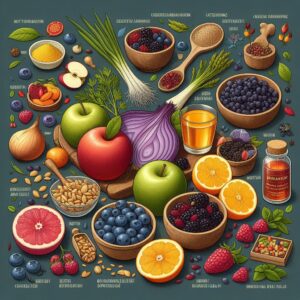
Flavonoids, a diverse group of phytonutrients found in virtually all fruits and vegetables, play a crucial role in disease prevention, particularly for men. These compounds are not only responsible for the vivid colors in many fruits and vegetables but also provide significant health benefits.
1. What are Flavonoids?
Flavonoids are a large family of over 6,000 polyphenolic compounds that naturally occur in plants. They act as powerful antioxidants, protecting the body’s tissues against oxidative stress and inflammation, both of which are linked to a range of chronic diseases. Types of flavonoids include quercetin, rutin, catechins, and anthocyanins, each having unique benefits and occurring in different plant-based sources.
2. Sources of Flavonoids:
To ensure a rich intake of flavonoids, men should include a diverse range of foods in their diet:
– Quercetin: Found in onions, apples, and dark berries, quercetin is renowned for its anti-inflammatory and antioxidant effects.
– Rutin: Abundant in buckwheat, asparagus, and citrus fruits, rutin supports blood vessel health.
– Catechins: Predominantly found in green tea, catechins are known for their role in weight management and heart health.
– Anthocyanins: These give red, blue, and purple berries their vibrant colors and are also found in red onions and grapes.
3. Flavonoids and Chronic Disease Prevention:
The impact of flavonoids on chronic disease prevention in men is profound:
– Heart Health: Flavonoids help to improve heart health by reducing blood pressure, lowering cholesterol, and decreasing inflammation. Regular consumption of flavonoid-rich foods like berries and green tea has been linked to a reduced risk of cardiovascular diseases.
– Cancer Prevention: These compounds exhibit anti-carcinogenic properties by helping to inhibit the growth and spread of cancer cells. Flavonoids can modulate cell signaling pathways, reducing the risk of cancers commonly affecting men, such as colon and prostate cancer.
– Cognitive Health: Flavonoids like those found in green tea and citrus fruits can enhance brain function and may help ward off cognitive decline with age by promoting brain perfusion and protecting neurons against damage.
– Diabetes Management: By influencing glucose metabolism and helping to regulate blood sugar levels, flavonoids can play a preventive role in the development of type 2 diabetes.
V. Selenium:
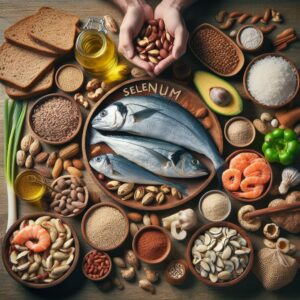
Selenium is a vital trace mineral that plays a critical role in maintaining men’s health, particularly in the prevention of chronic diseases. Despite its necessity in only small amounts, selenium’s impact on bodily functions and disease prevention is substantial.
1. What is Selenium?
Selenium is a trace element that is essential for the proper functioning of the human body. It is a component of more than two dozen selenoproteins that perform crucial tasks ranging from synthesizing DNA to protecting against oxidative damage and infection. Selenium’s antioxidant properties make it a key player in immune system health and in reducing the risk of chronic conditions.
2. Sources of Selenium:
Men can boost their selenium levels through a balanced diet that includes diverse food sources:
– Brazil Nuts: One of the richest natural sources of selenium; just one Brazil nut can provide more than the daily recommended intake.
– Seafood: Fish like tuna, halibut, and sardines, as well as shellfish such as shrimp and oysters, are excellent sources.
– Whole Grains: Whole-wheat bread, brown rice, and oatmeal contain significant amounts of selenium.
– Meats: Beef, chicken, and turkey offer this mineral, with organ meats being particularly rich in selenium.
3. Selenium and Chronic Disease Prevention:
Selenium’s preventive role against chronic diseases is well-documented:
– Cancer Prevention: Selenium boosts the body’s antioxidant capacity and helps reduce the risk of cancer by preventing cellular damage from free radicals. Studies have shown a link between higher selenium levels and a reduced risk of certain types of cancer, including prostate and lung cancer.
– Heart Health: By protecting against oxidative stress, selenium can help reduce the risk of heart disease. It helps to lower inflammation and may prevent blood clots by keeping blood vessels healthy.
– Immune Support: Selenium is crucial for immune function. It aids the production of white blood cells and helps to mount an effective defense against infections and viruses.
– Thyroid Function: This mineral is essential for the proper functioning of the thyroid gland, which regulates metabolism. Adequate selenium intake is necessary to prevent thyroid disorders, which can impact energy levels and overall metabolic health.
VI. Zinc:
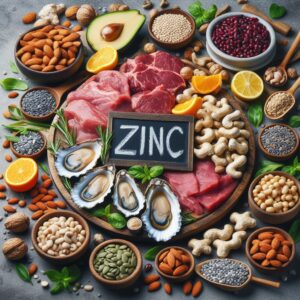
Zinc is a vital mineral that plays a crucial role in numerous biological processes, including immune function, DNA synthesis, and cellular metabolism. For men, zinc is particularly important not only for maintaining general health but also for preventing chronic diseases.
1. What is Zinc?
Zinc is an essential trace mineral that the body requires for the activity of over 300 enzymes that aid in metabolism, digestion, nerve function, and many other processes. It is particularly known for its role in enhancing the immune system, wound healing, DNA synthesis, and cell division. Zinc also supports normal growth and development during pregnancy, childhood, and adolescence.
2. Sources of Zinc:
Zinc is abundantly available in a variety of foods, making it easy for men to incorporate into their diets:
– Meats: Beef, pork, and lamb contain high amounts of zinc, especially in lean cuts.
– Oysters: Among the richest sources of zinc, oysters provide significantly more zinc per serving than any other food.
– Legumes: Chickpeas, lentils, and beans not only provide zinc but also fiber and protein.
– Nuts and Seeds: Almonds, pumpkin seeds, and cashews are good sources of zinc and other vital nutrients.
3. Zinc and Chronic Disease Prevention:
Zinc’s role in disease prevention is supported by its various biological functions:
– Immune System Support: Zinc is crucial for maintaining a strong immune system. It helps in the production and activation of T-lymphocytes, cells that manage the body’s immune response. Adequate zinc levels can reduce the duration and severity of colds and other infections.
– Antioxidant and Anti-inflammatory Effects: Zinc acts as an antioxidant, helping to fight oxidative stress and decrease the risk of chronic inflammatory diseases, such as heart disease, diabetes, and cancer.
– Hormonal Health: Zinc plays a significant role in hormonal balance, including testosterone levels, which are essential for reproductive health and muscle growth.
– Skin Integrity: Zinc assists in maintaining skin integrity and structure. It speeds up wound healing and reduces the risk of skin infections and conditions such as acne.
VII. Coenzyme Q10 (CoQ10):
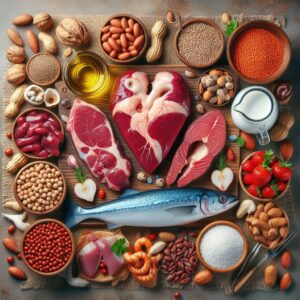
Coenzyme Q10 (CoQ10) is a vital nutrient that plays a pivotal role in health and vitality, particularly in men. As a naturally occurring antioxidant within the body, CoQ10 is essential for the basic functioning of cells and for optimizing energy production.
1. What is Coenzyme Q10?
Coenzyme Q10, also known as ubiquinone, is a substance that helps convert food into energy. Found in every cell of the body, CoQ10 is vital for the production of adenosine triphosphate (ATP), which fuels cellular operations and supports overall bodily functions. As men age, the natural production of CoQ10 can decrease, making supplementation and dietary intake increasingly important.
2. Sources of Coenzyme Q10:
To maintain optimal levels of CoQ10, men should consider incorporating the following foods into their diet:
– Meat: Particularly organ meats like the heart, liver, and kidney have high levels of CoQ10.
– Fish: Fatty fish such as salmon, mackerel, and sardines are excellent sources of CoQ10.
– Whole Grains: These contain moderate amounts of CoQ10 and are beneficial for overall health.
– Nuts and Seeds: Particularly peanuts, sesame seeds, and pistachios are good plant-based sources of CoQ10.
3. Coenzyme Q10 and Chronic Disease Prevention:
The role of CoQ10 in preventing chronic diseases is significant due to its numerous health benefits:
– Heart Health: CoQ10 has been shown to improve heart health by helping to maintain the optimal energy production in cells, reducing oxidative damage, and aiding in the management of heart-related conditions such as congestive heart failure and hypertension.
– Cancer Prevention: As an antioxidant, CoQ10 protects cells from oxidative stress and may reduce the risk of cancer development. Studies suggest that CoQ10 can help manage the side effects of cancer treatments, such as chemotherapy.
– Neuroprotective Effects: There is growing evidence that CoQ10 has beneficial effects on neurological health. It may help prevent degenerative brain disorders such as Parkinson’s disease and Alzheimer’s by mitigating oxidative damage and supporting cellular energy outputs.
– Diabetes Management: CoQ10 may help improve insulin sensitivity and regulate blood sugar levels, which are crucial for the prevention and management of diabetes.
VIII. Polyphenols:
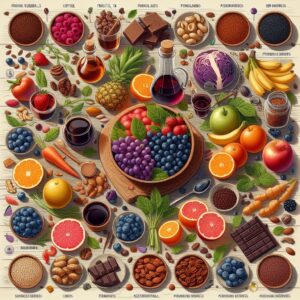
Polyphenols, a diverse group of phytonutrients found in plant foods, are celebrated for their health-promoting properties, especially in the prevention of chronic diseases in men.
1. What are Polyphenols?
Polyphenols are natural compounds that plants produce to protect themselves from UV radiation and various pathogens. In humans, these compounds act as powerful antioxidants with anti-inflammatory properties. There are several types of polyphenols, including flavonoids, phenolic acids, stilbenes, and lignans, each found in different plant sources and offering unique health benefits.
2. Sources of Polyphenols:
To harness the health benefits of polyphenols, men should incorporate a variety of polyphenol-rich foods into their diet:
– Flavonoids: Found in fruits, vegetables, tea, and chocolate.
– Phenolic acids: Present in coffee, tea, and colorful fruits and vegetables.
– Stilbenes (Resveratrol): Best known for being in red wine, but also found in peanuts and berries.
– Lignans: Found in seeds, particularly flaxseeds, as well as in grains and some vegetables.
3. Polyphenols and Chronic Disease Prevention:
The impact of polyphenols on chronic disease prevention is profound due to their bioactive properties:
– Cardiovascular Health: Polyphenols help improve heart health by reducing blood pressure, lowering cholesterol levels, and decreasing inflammation. Resveratrol, for example, has been shown to enhance vascular function and protect against arterial damage.
– Cancer Prevention: The antioxidant and anti-inflammatory effects of polyphenols can significantly reduce the risk of cancer. They help protect cells from DNA damage and inhibit the growth and proliferation of cancer cells.
– Cognitive Health: Polyphenols such as those found in green tea and berries may help enhance brain health and cognitive function. They are associated with a lower risk of cognitive decline and neurodegenerative diseases like Alzheimer’s.
– Diabetes Management: By influencing insulin sensitivity and glucose metabolism, polyphenols can play a critical role in managing and preventing type 2 diabetes.
Conclusion:
Antioxidants play a pivotal role in safeguarding men’s health by preventing oxidative damage and supporting cellular functions. From bolstering heart health and immune response to preventing cancer and supporting brain health, the diverse benefits of these powerful compounds are undeniable. Men are encouraged to incorporate a variety of antioxidant-rich foods into their diet to combat chronic diseases and maintain optimal health throughout their lives. This comprehensive exploration not only informs but also empowers men to take proactive steps toward a healthier future.

